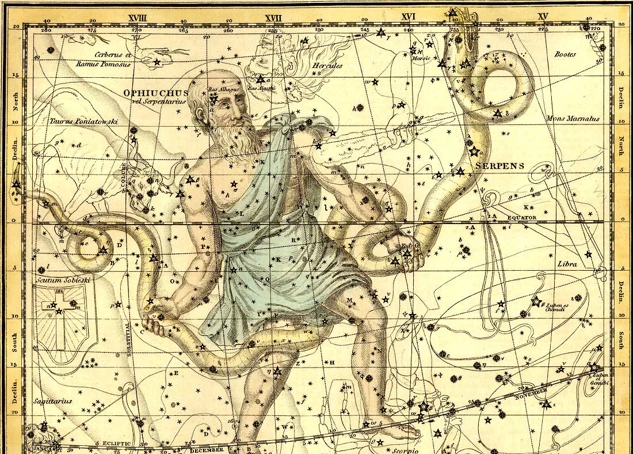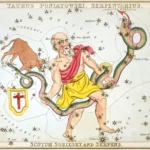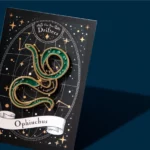Unveiling the Ancient Origins of Ophiuchus in Mythology – A Forgotten Zodiac Sign Resurrected. Hidden within the depths of mythology lies a captivating tale that has long been overlooked – the story of Ophiuchus. This enigmatic figure, often referred to as the Serpent Bearer, possesses an intriguing history that spans across multiple cultures. From Greek and Egyptian mythology to Mesopotamian and Native American folklore, the presence of Ophiuchus weaves a mysterious thread throughout time. In this enthralling exploration, we will journey into the depths of ancient beliefs, untangling the intricacies of Ophiuchus’ mythology and its impact on astrology. Prepare to be engrossed as we delve into the forgotten tales, symbols, and cultural references that revolve around this celestial enigma.
Contents
- The Legend of Ophiuchus
- Ophiuchus in Greek Mythology
- Ophiuchus in Egyptian Mythology
- Ophiuchus in Mesopotamian Mythology
- Ophiuchus in Native American Mythology
- Other Cultural References
- The Influence on Astrology
- Contemporary Interpretations
- Conclusion
- Frequently Asked Questions
- References
-
Frequently Asked Questions
- What is Ophiuchus?
- How did Ophiuchus get its name?
- Is Ophiuchus part of the zodiac?
- What is the legend of Ophiuchus?
- Who is Asclepius and what is his connection to Ophiuchus?
- What is the story of Ophiuchus and the serpent in Greek mythology?
- What role does Ophiuchus play in Egyptian mythology?
- How does Ophiuchus connect to the story of Gilgamesh?
- Who is Enki and what is his connection to Ophiuchus?
- How is Ophiuchus represented in Native American mythology?
- References
- Read More
The Legend of Ophiuchus
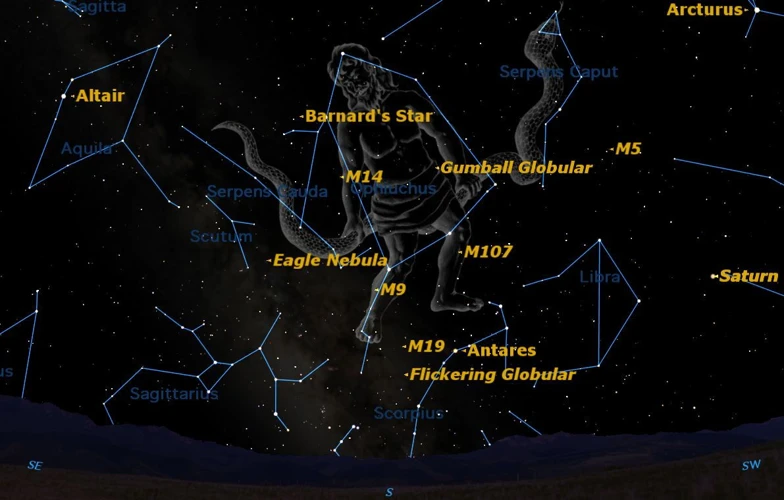
The Legend of Ophiuchus, often referred to as the Serpent Bearer, is a tale steeped in ancient mythology. In Greek mythology, Ophiuchus is associated with the story of Asclepius, the son of Apollo and the god of medicine and healing. Asclepius possessed incredible healing abilities and was revered as a great physician. According to the myth, Asclepius was taught the art of healing by Chiron, the wise centaur. He became so skilled in his craft that he could even resurrect the dead. This act of defying death led to Zeus, the king of the gods, striking him down with a lightning bolt, fearing that mortals would no longer fear death. However, in recognition of his renowned abilities, Zeus placed Asclepius among the stars, transforming him into the constellation of Ophiuchus. With his healing staff, known as the Rod of Asclepius, Ophiuchus continues to symbolize the power of medicine and the pursuit of healing. This ancient tale not only reveals the significance of Ophiuchus in Greek mythology but also highlights the profound connection between medicine, knowledge, and the celestial realm.
(keywords: The Legend of Ophiuchus, Serpent Bearer, Greek mythology, Asclepius, healing, medicine, Rod of Asclepius)
Ophiuchus in Greek Mythology
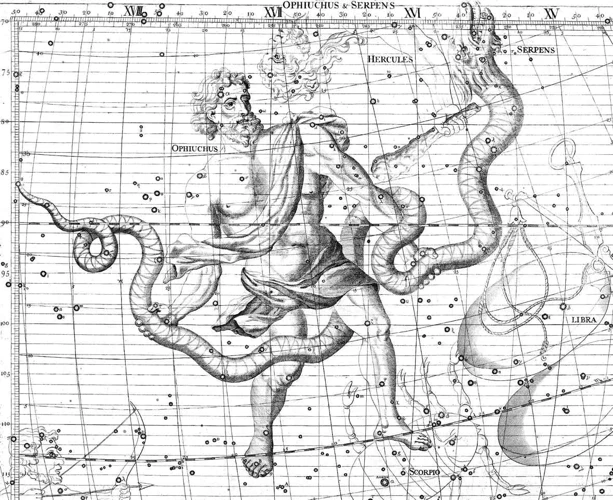
In Greek mythology, Ophiuchus holds a significant place as the constellation representing the Serpent Bearer. This constellation is associated with the legendary figure of Asclepius, the god of medicine and healing. Asclepius was renowned for his extraordinary abilities in the field of medicine, learned from the wise centaur, Chiron. One famous myth depicts Asclepius mastering the art of healing to such an extent that he could resurrect the dead, an act that worried Zeus. In his anger, Zeus struck down Asclepius with a lightning bolt, but in recognition of his exceptional skills and contributions, Zeus immortalized him by transforming him into the constellation Ophiuchus. Ophiuchus is often depicted holding a staff entwined with a serpent, forming the symbol known as the Rod of Asclepius, which has become synonymous with medicine and healing. This tale exemplifies the significance of Ophiuchus in Greek mythology, representing the power of healing, the pursuit of knowledge, and the interconnectedness between medicine and the celestial realm.
(Keywords: Ophiuchus, Greek mythology, constellation, Serpent Bearer, Asclepius, medicine, healing, Rod of Asclepius)
The Story of Asclepius
The Story of Asclepius, the legendary figure associated with Ophiuchus in Greek mythology, unfolds with remarkable intrigue. According to the myth, Asclepius was the son of Apollo, the god of healing and medicine, and a mortal woman named Coronis. Asclepius’s birth was not without drama, as his mother fell in love with another man named Ischys while she was pregnant with him. Apollo, known for his jealousy, discovered this betrayal and swiftly struck Coronis with an arrow, causing her demise. However, he was overcome with remorse and rescued Asclepius from his mother’s womb before she was consumed by flames.
Raised by the centaur Chiron, Asclepius was taught the art of medicine and healing. His exceptional skills and knowledge surpassed all mortal healers, and he soon became renowned for his ability to cure illnesses and even bring the dead back to life. With a staff entwined by a serpent, which is now recognized as the Rod of Asclepius, he journeyed across lands, healing the sick and imparting his wisdom.
Asclepius’s extraordinary abilities, particularly his power to resurrect the dead, caught the attention of Zeus, the ruler of the gods. Fearing that mortals would become fearless in the face of death and upset the balance of the natural order, Zeus took action. He struck Asclepius down with a lightning bolt, ending his mortal life. However, honoring his contributions to humanity and the significance of his healing skills, Zeus immortalized Asclepius by placing him among the stars as the constellation Ophiuchus.
The Story of Asclepius not only delves into the extraordinary life and talents of this mythical figure but also emphasizes the timeless fascination with medicine, healing, and the eternal quest for immortality.
(keywords: The Story of Asclepius, Ophiuchus, Greek mythology, healing, medicine, Rod of Asclepius, Zeus, immortality)
Ophiuchus and the Serpent
Ophiuchus and the Serpent intertwine in a symbolic dance that holds deep meaning in mythology. In Greek mythology, Ophiuchus is often depicted as a skilled healer and is closely associated with serpents. The most famous representation of this connection is the Rod of Asclepius, a staff entwined by a single serpent. This symbol has become synonymous with medicine and healing. The serpent in this context represents rejuvenation, transformation, and the shedding of old skin, symbolizing the healing process. In addition to the Rod of Asclepius, Ophiuchus is also linked to the constellation Serpens, which is divided into two parts: Serpens Caput (the snake’s head) and Serpens Cauda (the snake’s tail). The presence of the serpent in Ophiuchus’ mythology underscores the significance of healing, wisdom, and the cyclic nature of life. It serves as a reminder that transformation and growth are inherent parts of the human experience.
(keywords: Ophiuchus and the Serpent, Rod of Asclepius, Greek mythology, healer, serpents, symbolism)
Ophiuchus in Egyptian Mythology
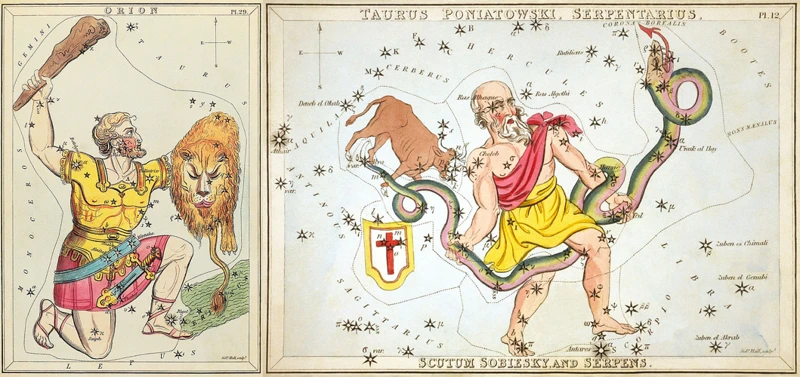
Ophiuchus also holds significance in Egyptian mythology, where it is closely associated with the god Imhotep. Imhotep, considered the god of medicine and healing, was a highly revered figure in ancient Egypt. He was believed to possess immense wisdom and knowledge, not only in medicine but also in architecture, astronomy, and law. Imhotep was known for his miraculous healing abilities. He was often depicted with a serpent entwined around a staff, resembling the modern symbol of medicine, the Caduceus. This imagery draws parallels to Ophiuchus, reinforcing the connection between the constellation and the healing arts. Imhotep’s influence reached far beyond his deified status, as he was also credited with the construction of the pyramids and the development of early medical practices. The presence of Ophiuchus in Egyptian mythology showcases the significance placed on healing and the belief in the power of divine intervention to bring forth restoration and well-being.
(keywords: Ophiuchus, Egyptian mythology, Imhotep, god of medicine, Caduceus, healing, divine intervention)
Ophiuchus in Mesopotamian Mythology
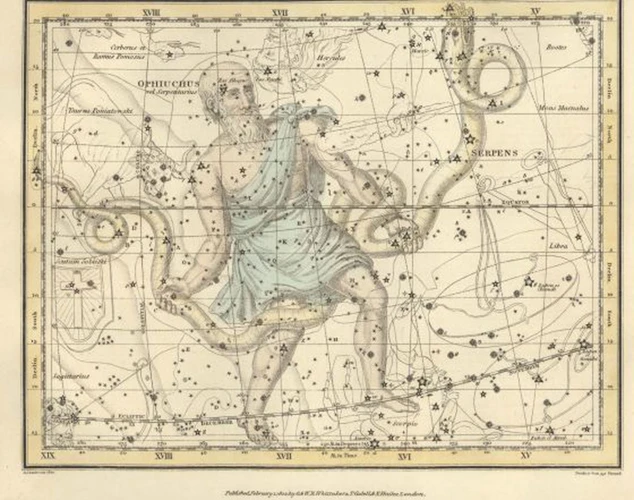
In Mesopotamian mythology, Ophiuchus holds a significant place as a celestial figure associated with healing and knowledge. Known as the “Serpent Holder,” Ophiuchus is often identified with the god Enki, the god of wisdom and water. In ancient Mesopotamian texts, Enki is depicted as a deity who possesses vast knowledge and offers guidance to humanity. Ophiuchus is closely associated with the story of Gilgamesh, the legendary hero-king of Uruk. According to the myth, Gilgamesh embarks on a quest for immortality and seeks the counsel of Utnapishtim, who survived the Great Flood. Utnapishtim directs Gilgamesh to Ophiuchus, who holds the secret to eternal life. In this Mesopotamian context, Ophiuchus symbolizes the pursuit of wisdom, the quest for immortality, and the eternal cycle of life and death. This connection between Ophiuchus, Enki, and the epic of Gilgamesh offers a glimpse into the rich mythology of Mesopotamia and the role that celestial beings played in providing wisdom and guidance to humanity.
(keywords: Ophiuchus in Mesopotamian mythology, Serpent Holder, Enki, Gilgamesh, wisdom, knowledge, immortal life)
The Connection to Gilgamesh
The Connection to Gilgamesh reveals yet another fascinating aspect of Ophiuchus’ presence in mythology. In Mesopotamian mythology, the epic tale of Gilgamesh, one of the oldest surviving works of literature, holds the key to understanding Ophiuchus’ significance. Gilgamesh, a powerful king, embarks on a quest for immortality after the death of his close friend Enkidu. During his journey, he encounters Utnapishtim, the Mesopotamian equivalent of Noah, who survived a great flood and was granted eternal life by the gods. Interestingly, Utnapishtim is often associated with the constellation Ophiuchus, further emphasizing the connection between this celestial figure and immortality. The presence of Ophiuchus in the epic of Gilgamesh suggests that Ophiuchus represents not only healing and medicine but also the eternal quest for everlasting life. This captivating link between Ophiuchus and the epic of Gilgamesh showcases the enduring influence of this constellation across different mythological traditions.
(keywords: The Connection to Gilgamesh, Mesopotamian mythology, Gilgamesh, Utnapishtim, epic, immortality, everlasting life)
Ophiuchus and Enki
Ophiuchus and Enki, the god of wisdom and water in Mesopotamian mythology, share a fascinating connection that highlights the significance of Ophiuchus in ancient beliefs. In Mesopotamian texts, Enki is depicted as a benevolent deity associated with creation, knowledge, and healing. Interestingly, Enki is often depicted with a serpent coiled around his body, reminiscent of the constellation Ophiuchus, which signifies the Serpent Bearer. This association between Enki and the serpent suggests a symbolic connection to Ophiuchus’ role as a healer and holder of esoteric knowledge. Enki’s wisdom and association with serpents align with Ophiuchus’ portrayal as a figure of healing and the ancient belief in the serpent’s ability to bring transformation and enlightenment. This interplay between Enki and Ophiuchus highlights the deep spiritual and mythological connections present in Mesopotamian culture, showcasing the profound influence that Ophiuchus held in the ancient civilization.
(keywords: Ophiuchus and Enki, Mesopotamian mythology, Enki, serpent, creation, knowledge, healing, symbolism)
Ophiuchus in Native American Mythology

Ophiuchus also finds its place in the rich tapestry of Native American mythology, where it assumes various forms and holds different significance among different tribes. In the Lakota Sioux tradition, Ophiuchus is associated with the story of the White Buffalo Calf Woman, a sacred figure who brought spiritual teachings and the gift of the pipe to the people. Among the Lakota, Ophiuchus is seen as the caretaker of healing herbs and plants, representing the connection between nature, healing, and spiritual wisdom. Similarly, in the Navajo tradition, Ophiuchus is considered a powerful protector and healer, responsible for maintaining the balance between the physical and spiritual realms. The Apache tribe sees Ophiuchus as an embodiment of wisdom and transformation, capable of guiding individuals through challenges and facilitating personal growth. While the specific details and interpretations may vary, the common thread is that Ophiuchus is revered as a symbol of healing, wisdom, and spiritual guidance in Native American mythology.
(keywords: Ophiuchus, Native American mythology, Lakota Sioux, White Buffalo Calf Woman, healing, spiritual wisdom, Navajo, Apache, protector, wisdom, transformation)
Other Cultural References
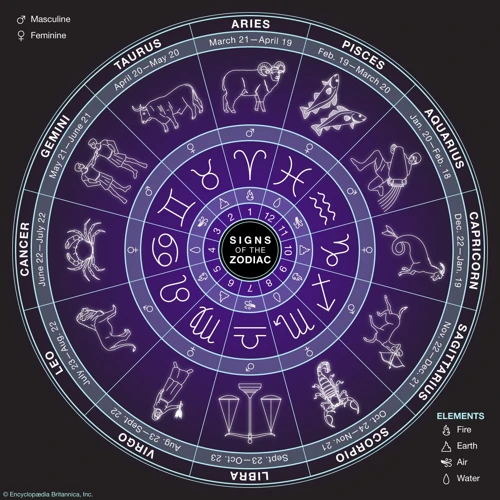
Other cultural references to Ophiuchus can be found in various mythologies and belief systems. In Egyptian mythology, Ophiuchus is associated with the deity Imhotep, who was considered the god of medicine and wisdom. Imhotep, like Asclepius, was highly regarded for his healing abilities and was worshipped as a divine being. The presence of Ophiuchus extends to Mesopotamian mythology as well, where it is believed to represent the connection between the divine and mortal realms. In Native American mythology, Ophiuchus is often associated with the constellation of the Serpent, which plays a significant role in creation stories and symbolizes the cycle of life. These diverse cultural references highlight the universality of Ophiuchus’ influence and its significance in different traditions. While interpretations may vary, the common thread is the recognition of Ophiuchus as a symbol of healing, wisdom, and the interplay between humanity and the divine.
(keywords: Other Cultural References, Ophiuchus, Egyptian mythology, Imhotep, Mesopotamian mythology, Native American mythology, healing, wisdom)
The Influence on Astrology
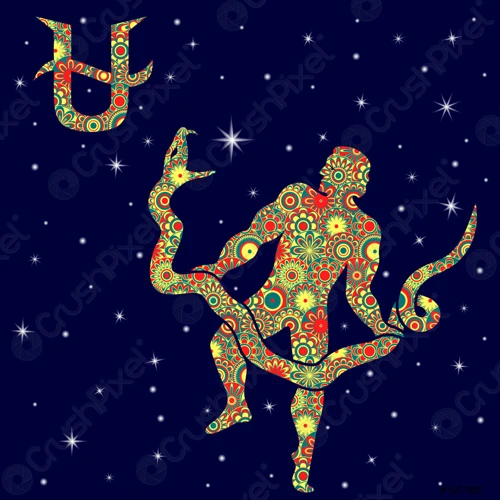
The Influence on Astrology
Ophiuchus, the forgotten zodiac sign, has made a noteworthy impact on the realm of astrology. Traditionally, astrology revolves around the twelve zodiac signs that correspond to specific time periods throughout the year. However, with the reemergence of Ophiuchus, astrologers have faced the challenge of incorporating this celestial entity into their interpretations.
Astrologers believe that Ophiuchus carries the traits and characteristics of an individual who is driven by knowledge, wisdom, and healing. Similarly, those born under the sign of Ophiuchus are thought to possess a strong sense of justice and a desire to make a positive impact on the world. The Serpent Bearer’s inclusion in astrology expands the possibilities for understanding personality traits and provides fresh insights for individuals seeking self-discovery.
Although Ophiuchus does not fall neatly into the traditional zodiac calendar, astrologers have taken up the task of decoding its influence and exploring the unique attributes associated with this constellation. It serves as a reminder that astrology is an evolving art, constantly adapting to incorporate new insights and symbolism.
Ophiuchus has sparked discussions and debates among astrologers and enthusiasts alike, encouraging a deeper exploration of the boundaries of astrology and the human psyche. Some argue that including Ophiuchus as a thirteenth zodiac sign may provide a more accurate representation of individuals’ personalities and life paths.
As astrology evolves, so too does our understanding of the role Ophiuchus plays in the complex tapestry of zodiac signs. Astrologers continue to analyze and decipher the influences of this celestial figure, aiming to provide a more nuanced and comprehensive perspective on individuals’ astrological profiles.
(keywords: Influence on Astrology, zodiac sign, astrology, Ophiuchus, traits, personality, self-discovery)
Contemporary Interpretations
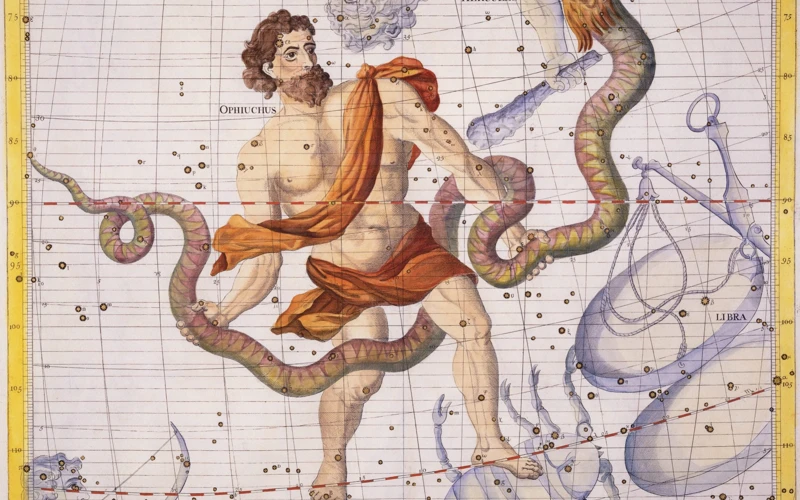
Contemporary Interpretations of Ophiuchus have emerged in recent times, as interest in astrology and celestial symbolism has grown. While Ophiuchus is not officially recognized as one of the twelve zodiac signs, there are astrologers and enthusiasts who believe in its significance and include it in their interpretations. Some consider Ophiuchus as a thirteenth zodiac sign, representing individuals born between November 29 and December 17. These individuals are said to possess unique traits and characteristics that set them apart from others. They are often seen as ambitious, intuitive, and creative, with a deep desire for knowledge and truth. Some interpretations suggest that Ophiuchus individuals have a profound healing presence and the ability to guide others towards transformation and self-discovery. However, it’s important to note that these contemporary interpretations are not universally accepted in the astrological community. Skeptics argue that the inclusion of Ophiuchus disrupts the established system and dilutes the significance of the existing zodiac signs. Regardless of these debates, the interest in Ophiuchus and its contemporary interpretations continue to fascinate those exploring the intricacies of astrology.
(keywords: Contemporary Interpretations, Ophiuchus, zodiac signs, astrology, traits, characteristics, healing, transformation)
Conclusion
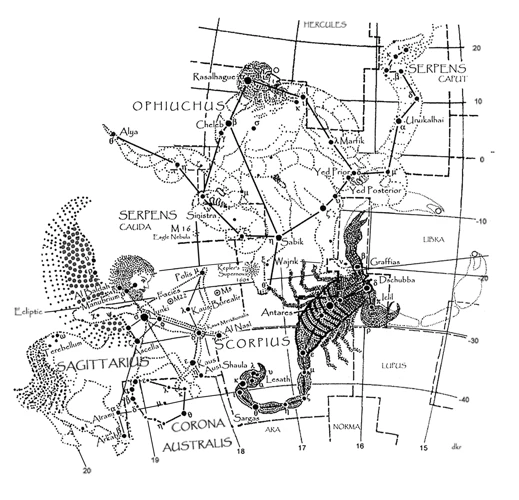
In conclusion, the exploration of Ophiuchus in mythology unveils a captivating journey through various cultures and beliefs. From its origins in Greek mythology as Asclepius, the god of healing, to its presence in Egyptian and Mesopotamian mythology, Ophiuchus holds a significant place in ancient stories and legends. Its symbolism as the Serpent Bearer represents the power of medicine, healing, and the pursuit of knowledge. Moreover, Ophiuchus has also left its mark in Native American mythology and has influenced contemporary interpretations and astrological associations. This celestial enigma continues to intrigue and fascinate enthusiasts, offering a deeper understanding of the connections between the celestial and human realms. Whether exploring Ophiuchus’ strengths and weaknesses or delving into its compatibility with other zodiac signs, the legends surrounding this forgotten constellation continue to captivate and provoke curiosity. As we navigate the love life of Ophiuchus, it becomes evident that this enigmatic figure holds a unique position in astrology and mythology. With its rich and varied history, Ophiuchus remains a fascinating subject of study, uncovering the hidden treasures of our ancient past.
(Keywords: Ophiuchus in mythology, Serpent Bearer, healing, astrology, Ophiuchus strengths, Ophiuchus weaknesses, compatibility, love life, ancient past)
Frequently Asked Questions
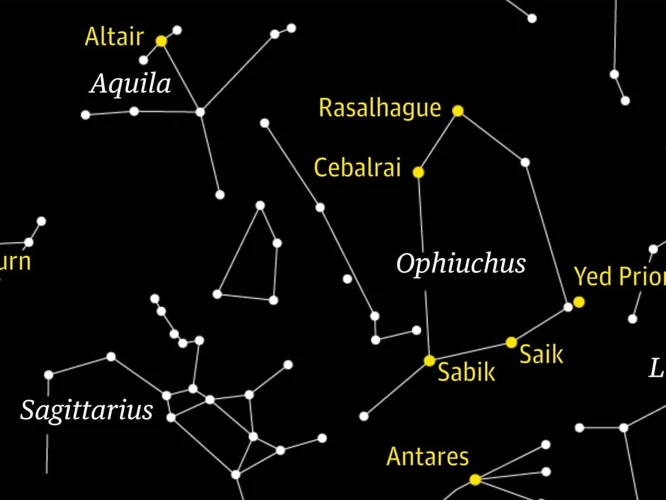
FAQs about Ophiuchus in Mythology
1. Who is Ophiuchus in Greek mythology?
Ophiuchus is associated with the story of Asclepius, the son of Apollo and the god of medicine and healing. He was transformed into the constellation of Ophiuchus by Zeus after his death.
2. What does the Rod of Asclepius represent?
The Rod of Asclepius, held by Ophiuchus, represents healing and medicine. It is a symbol commonly associated with the medical profession.
3. What significance does Ophiuchus hold in Egyptian mythology?
Ophiuchus is not prominently featured in Egyptian mythology. However, the serpent symbolism associated with Ophiuchus does align with the importance of serpents in ancient Egyptian beliefs, representing renewal and protection.
4. Is there a connection between Ophiuchus and the epic of Gilgamesh in Mesopotamian mythology?
While there is no direct connection between Ophiuchus and the epic of Gilgamesh, both have serpent-related elements in their respective mythologies. The serpent is a recurring symbol in Mesopotamian mythology, often representing wisdom, fertility, and chaos.
5. How does Ophiuchus feature in Native American mythology?
In Native American mythology, Ophiuchus is not as commonly mentioned compared to other constellations. However, some tribes associate it with healing and medicinal knowledge, similar to its representation in Greek mythology.
6. How has Ophiuchus influenced astrology?
Ophiuchus has had some influence on astrology with its inclusion as a zodiac sign in certain astrological systems. It offers an alternative perspective on personality traits and characteristics for individuals born under this sign.
7. Are there any known strengths or weaknesses associated with Ophiuchus individuals?
Although not widely studied or recognized in mainstream astrology, some enthusiasts believe that Ophiuchus individuals possess strengths such as intuition, healing abilities, and the pursuit of knowledge. As for weaknesses, little information is available due to its relatively recent inclusion as a zodiac sign.
8. Is there a compatibility between Ophiuchus and Capricorn?
While compatibility in astrology depends on various factors, Ophiuchus and Capricorn share some similarities. Both signs are associated with discipline, determination, and the pursuit of success, which may contribute to a harmonious relationship.
9. How can someone navigate the love life of an Ophiuchus individual?
As with any individual, understanding and open communication are key in navigating a relationship with an Ophiuchus. Celebrating their healing and compassionate nature while respecting their need for independence can contribute to a fulfilling love life.
10. Can Ophiuchus individuals relate to any specific existing astrological sign?
There is no definitive answer to this question. Some individuals born under Ophiuchus may resonate with the traits of neighboring signs such as Scorpio and Sagittarius, but each person’s unique birth chart and personal experiences contribute to their individuality.
References
- Secret Societies and Hidden Knowledge: The Explosive …
- Is Ophiuchus the 13th constellation of the zodiac?
- Ophiuchus: Facts about the Snake Bearer
Frequently Asked Questions

What is Ophiuchus?
Ophiuchus is a constellation located in the celestial equator. It is represented as a man holding a snake or serpent.
How did Ophiuchus get its name?
The name Ophiuchus comes from the Greek word “ophis,” which means serpent, and “ocheir,” which means holding. It refers to the image of the man in the constellation holding a snake.
Is Ophiuchus part of the zodiac?
While Ophiuchus is not traditionally considered part of the zodiac, it is sometimes referred to as the 13th zodiac sign. However, it does not have the same astrological significance as the other 12 zodiac signs.
What is the legend of Ophiuchus?
The legend of Ophiuchus varies across different cultures, but it often involves a skilled healer or physician who possesses the power to bring balance and harmony to the world.
Who is Asclepius and what is his connection to Ophiuchus?
Asclepius was a legendary physician in Greek mythology. He is often associated with Ophiuchus because he was depicted as a man holding a staff with a snake wrapped around it, similar to the constellation.
What is the story of Ophiuchus and the serpent in Greek mythology?
In Greek mythology, Ophiuchus is said to have been given a snake by the god Apollo. He used the snake’s venomous powers to bring the dead back to life. This act angered the gods, and Ophiuchus was eventually placed in the sky as the constellation.
What role does Ophiuchus play in Egyptian mythology?
In Egyptian mythology, Ophiuchus is associated with the god Imhotep, who was revered as a healer and physician. Imhotep is often depicted with a snake on his staff, similar to the constellation.
How does Ophiuchus connect to the story of Gilgamesh?
In the Epic of Gilgamesh, the hero encounters a serpent who possesses the secret of immortality. This serpent is often associated with Ophiuchus and represents the knowledge and wisdom associated with the constellation.
Who is Enki and what is his connection to Ophiuchus?
In Mesopotamian mythology, Enki is a god associated with knowledge and healing. Ophiuchus is sometimes seen as a representation of Enki’s healing abilities and wisdom.
How is Ophiuchus represented in Native American mythology?
In Native American mythology, Ophiuchus is often linked to the Medicine Man archetype, who is a powerful healer and spiritual guide. The constellation symbolizes the power of transformation and spiritual growth.

